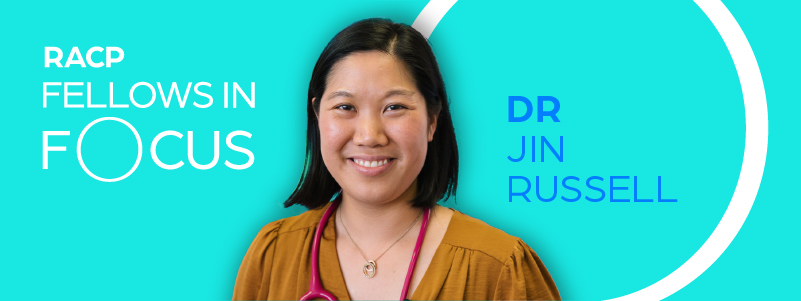RACP Fellows in Focus: Dr Jin Russell
Date published:
03 May 2021

Dr Jin Russell went into paediatrics because she really enjoyed spending time with children. She had parents who were doctors, “I grew up in this very medical family, and I kind of knew what I was getting myself into. I felt like I was at my best when I was looking after other people, and particularly when I was looking after children,” recalled Jin.
“On the first day of starting as a paediatric house surgeon at the general paediatric ward at KidzFirst hospital in South Auckland, which serves some of the most disadvantaged communities in Aotearoa New Zealand, I stepped out of the lift onto the ward and there were kids in wheelchairs, sparring with each other. I thought 'this is just nuts' and I loved it. I find kid’s medicine delightful.”
Jin is now a developmental paediatrician at Starship Children’s Hospital. She is also a PhD student with the country’s largest study of children and their families – Growing Up in New Zealand. Jin is a previous member of the RACP’s College Council, College Trainees Committee and the New Zealand Policy and Advocacy Committee. When she has a brief moment, she writes op-ed pieces amongst the organised chaos of motherhood.
Despite her headstrong approach to become a paediatrician, the path to success was not without its share of doubts, “I had doubts all the way through medical school, until I found paediatrics. I almost quit medical school and thought about becoming a minister, maybe doing theological training, still with that sense of wanting to care for people. However, I stuck at medicine and that was probably because I saw senior doctors showing the kind of care and skill that I thought was amazing. That kept me going until I found paediatrics,” shared Jin.
Working in paediatrics is obviously not without its challenges. Her experience has shown that time and time again, good care hinges upon good communication, “I spend a lot of time trying to communicate with children who have difficulties communicating back. It takes quite a lot of focus to listen well to children. Listening, including listening to non-verbal communication, is the number one skill. We're very much embedded within a multidisciplinary team of therapists and schools. This type of work requires a high level of communication.”
If you’re interested in following in the footsteps of Jin, she offers this advice, “Find something that you're passionate about. When I say that, I mean, give yourself permission to rotate through different experiences and don't shortchange yourself. If you've gotten this far, as a trainee or Fellow of the RACP, chances are, you're a very special person with lots to contribute. We should give ourselves permission to look for what it is that we find really interesting. For me, that was a mix of hands-on clinical work, epidemiology and writing.”
“The thing that I'm the proudest of is taking my time in training. I only finished my RACP training at the end of last August, but I pursued the things that I felt were really meaningful during my training, and I did that amongst becoming a mother. I can hand on heart say that I've given it my very best shot. I've tried to be present and to be a great mum at the same time as juggling this intense professional career."
“I would love to see Aotearoa New Zealand as a place where every child flourishes and belongs. At the very beginning of Nelson's Textbook of Pediatrics, it says that the goal of paediatrics is to help every child have the opportunity to reach their full health and developmental potential. That’s the legacy that I want to contribute to for children in Aotearoa New Zealand.”